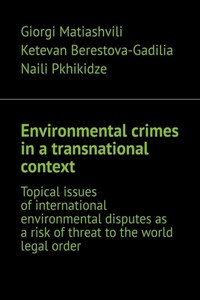GIORGI MATIASHVILI
![]()
MBA BACHELOR EN DROIT INTERNATIONAL. INTERNATIONAL LAWYER.Member of an,,International Bar Association,, IBA, a,,World Academy of Science Engineering and Technology,, WASET a,,European society of International Law,, ESILSEDI. Author of а book and scientific articles in international journals.
Contact information: mativar199@gmail.com
KETEVAN BERESTOVA-GADILIA
DOCTORAL CANDIDATE OF Ph. D IN LAW.Real member, of TAO-KLARJETI SCIENTIFIC ACADEMY. With 20 years of experience working in private and public structures. Author of a book and scientific articles in top international journals.Contact information:qetevanberestova@gmail.com
NAILI PKHIKIDZE
Ph.D.in Law, Real member, ACADEMICIAN of,, FAZISI ACADEMY,, With 27 years of experience working in private and public structures. Author of books and scientific articles in international journals.
Contact information: nai0202@mail.ru
Translation made: ZHANA TCHOLARIA. Master of Education (M. Ed). E-mail:getranslator1@gmail.com
,,As we progress into the twenty-first century, anyone who considers themselves a realist will have to make the environment a top priority.” -Leonardo DiCaprio
Extreme heat wave, severe forest fires, floods and other types of natural disasters around the world confirmed undoubtedly, that this is a climatic disruption, which turned out into a large-scale extreme situation for our entire planet.
,, God finds the quilty’”, as Homer said, and we entered in to the period of consequences. Governments simply observed, how the disasters spread out, striving forward to new pipe system and annual trillions in subsidies of fossil fuel. Correspondingly, against the background of commercial interests and striving for material wealth, they forgot and put under question tomorrow’s existence of their own habitat.
At the end of the 60s of the twentieth century, the United Nations Organization drew the attention of the world community to the rampant pollution of the environment and the exhaustibility of natural resources as one of the global problems of our time. Overgrowth of technological progress has changed the rules of the game of survival.
The emergence of international environmental law as a separate legal regime was a very important event in the late 1920s.
Environmental law represents the distinctive sub-discipline of public international law. The international community had been alarmed by environmental damage and technological disasters, which had tendencies to become more and more destructive. However, international environmental law has achieved considerable progressive growth and continues to adapt to the corresponding changes in the echo of the results of technological progress, but the state of the world’s environment continues to deteriorate.
The world community acknowledged, that the actual and potential consequences of the degradation of ambient environment are becoming such a serious, that the humankind and order of nature are under threat of extinction and therefore, it is necessary to pay more attention to prevention of the damage of ambient environment. In this regard, the use of international criminal justice to protect the ambient environment has become urgent. The consequences of some ecological disasters are perceived far beyond national borders, this is why, more stringent measures are needed to stop the repetition of events. The goal of our century is to turn back the tide of this process by making sure, that the governments are fully performing their obligations and gradually undertaking more stringent responsibilities in order to preserve the ambient environment.
This thesis, which is analyzing the spectrum of judicial bodies that deal with solving of environmental disputes, proposes a re-evaluation of their topicality in modern conditions. We think this thesis is especially topical in an epoch, when the issues of ambient environment are increasingly becoming the subject of consideration of international jurisdictions, and will represent the interest to those interested in this area of vital importance.
This thesis studies the international environmental crisis of the modern world and we tried to substantiate the necessity for international cooperation between states in the environmental field.
In our opinion, the development of international environmental cooperation should follow the road leading to the creation of a single international legal environmental law, one international environmental organization, and also one international environmental court.
International environmental law represents a very specific branch of international law, therefore, the judges should be experts in the field not only of ecology, but also specialists in the aerobatics of legal science – International law.
Both the state and international governmental and non-governmental organizations, as well as natural persons should have the right to access to international environmental justice without restriction.
Within the framework of international law, the fulfillment of the obligations undertaken by all states serves as a guarantor of the stability of the ecosystem of the world and the peaceful coexistence of states with different socio-political systems. In the modern world, primary importance is given to the issues of compliance by all subjects of international law of international obligations, related to compliance with the terms of the 1975 Helsinki Agreement. The obligations include: protection of ambient environment, prohibition and non-proliferation of weapons of mass destruction, prohibition of the elaboration, production, transportation, proliferation and use of chemical and biological weapons, etc.
According to Article 2 of the Resolution of UN General Assembly “On the responsibility of states for internationally wrongful acts,” to the elements of an internationally wrongful acts of a state refer to violations of an international legal obligation of that state. And according to the article 12 of the abovementioned resolution “There is a breach of an international obligation by a state when an act of that state is not in conformity with what is required of it by that obligation, regardless of its origin or character. Part II of the abovementioned resolution discloses the content of the international responsibility of states. It considers general principles (chapter I) and forms of indemnification (chapter II) by a State for its internationally wrongful act. Violation of the undertaken obligations within the international and interstate treaties, firstly, creates a threat to the existing system for the implementation of international agreements, and, secondly, generates the legal responsibility for failure to fulfill the obligations undertaken under the treaty.








